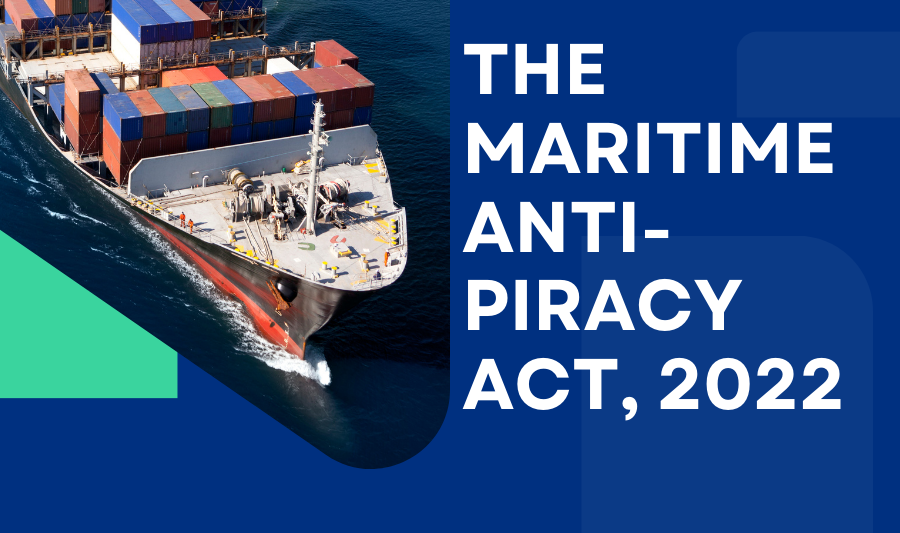Introduction
The Maritime Anti-Piracy Bill, 2022 received the President’s assent on 31st January 2023. It was introduced to give effect to the United Nations Convention on the Law of the Sea relating to repression of piracy on high seas. The Act provides for prevention of maritime piracy and stringent punishment to those convicted of such crimes.
While moving the bill for consideration and passage in the Upper House, External Affairs Minister S Jaishankar said this Bill would strengthen India’s maritime security and give it an effective legal instrument to combat the menace of piracy.
Aim
- Prevention of maritime piracy and prosecution of persons for piracy-related crimes.
- Strengthen coordination with other countries in anti-piracy activities.
- Provide an effective legal instrument to combat maritime piracy, in India’s territorial waters in the Exclusive Economic Zone and on the high seas.
- Enhance India’s prowess in the international arena and strengthen maritime security.
Piracy
Section 2(h) of the Act defines ‘Piracy’ as –
(i) any illegal act of violence or detention or any act of depredation committed for private ends by any person or by the crew or any passenger of a private ship and directed on the high seas against another ship or any person or property on board such ship;
(ii) any act of voluntary participation in the operation of a ship with knowledge of facts, making it a pirate ship;
(iv) any act which is deemed piratical under the international law including customary international law.
It includes inciting or of intentionally facilitating any of the above-mentioned acts as well.
Penalties
Various punishments for piracy have been prescribed in Sections 3,4 and 5 of the Act which include:
Punishment for act of piracy:
- Imprisonment which could extend to life in imprisonment with fine; or
- Death or with imprisonment for life, if person committing the act of piracy causes or attempts to cause death.
- Restitution or forfeiture of property could also be attracted in certain cases.
Attempt to commit, conspiracy, aid or abetment would attract:
- imprisonment for 10 years or fine or with both.
Participating, organising, or directing others to participate would attract:
- imprisonment up to 14 years, and a fine.
Extradition under Section 14:
The offences under this Act shall be deemed to have been included as extraditable offences and provided for in all extradition treaties made by India with any other State.
In the absence of a bilateral extradition treaty, the offences under this Act shall be extraditable offences between India and other State on the basis of reciprocity
Jurisdiction of the Courts
The central government, in consultation with the Chief Justice of the concerned High Court, may notify Sessions Courts as the Designated Courts under this Act.
The Designated Court will try offences committed by:
- A person in the custody of the Indian Navy or Coast Guard, regardless of his nationality.
- A citizen of India, a resident foreign national in India, or a stateless person.
The Court will not have jurisdiction over offences committed on a foreign ship unless an intervention is requested by:
- The country of origin of the ship.
- The ship-owner.
- Any other person on the ship.
- Warships and government-owned ships employed for non-commercial purposes will not be under the jurisdiction of the Court.
Challenges
Under the Act, any person who commits an act of piracy or causes death, he will be punished with death. This implies a mandatory death penalty for such offences. The Supreme Court has held that mandatory death penalty for any offence is unconstitutional as it violates Articles 14 and 21 of the Constitution.
Applicability
The Act will apply to all parts of the sea adjacent to and beyond the limits of the Exclusive Economic Zone of India. Exclusive Economic Zone refers to the area of sea to which India has exclusive rights for economic activities.
Arrest and seizure
A ship under the control of pirates may be seized, persons aboard may be arrested, and the property on board may also be seized.
Presumption of guilt
The presumption of guilt will be on the accused if:
- Accused is in possession of arms, explosives and other equipment which were used or intended for use in committing the offence,
- There is evidence of use of force against the ship’s crew or passengers, and
- There is evidence of the intended use of bombs and arms against the crew, passengers or cargo of a ship.
Conclusion
More than 90% of trade of the world takes place via sea routes. Between 2014 to 2022, 19 incidents of piracy occurred involving 155 Indian crew members. It is therefore crucial to have a domestic anti-piracy legislation to provide the necessary legal framework within the country for the prosecution of those involved in piracy-related crimes.

